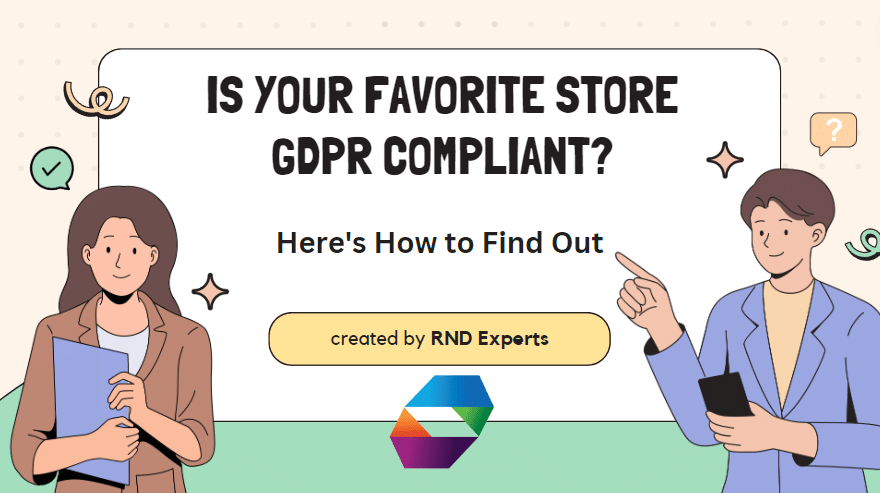Is Your Favorite Store GDPR Compliant? Here’s How to Find Out
June 10, 2024
Security ,Technology
Admin

In today’s digital age, we entrust a lot of personal information to online stores. But with great convenience comes great responsibility – the responsibility of these stores to handle our data securely and ethically.
The GDPR (General Data Protection Regulation) is a regulation in EU law that aims to give citizens control over their personal data and how it’s used. If you’re an EU resident shopping online, it’s important to understand how GDPR applies to you and how to ensure your favorite stores are playing by the rules.
Why Does GDPR Compliance Matter?
Imagine this: you browse a store for a new jacket, but for weeks afterward, you’re bombarded with targeted ads for similar items across the internet. This is just one example of how online stores can use your data – and under GDPR, they need to be transparent about it and get your consent.
GDPR compliance ensures:
- Transparency: You have the right to know what data is being collected, how it’s used, and who it’s shared with.
- Control: You can choose to opt-in or opt-out of marketing communications and data sharing.
- Security: Stores must have appropriate safeguards in place to protect your personal information.
- Accountability: You have the right to request access to your data and have it corrected or deleted.
How to Find Out If Your Favorite Store is GDPR Compliant
Here are three simple ways to check:
1. Privacy Policy Deep Dive: Every GDPR-compliant store will have a clear and accessible privacy policy. This document should outline the data they collect, how they use it, and your rights as a customer. Look for details on:
- The types of data collected (name, email, purchase history, etc.)
- The purposes for which data is used (order processing, marketing, etc.)
- How long data is stored
- Your rights under GDPR (access, rectification, erasure, restriction of processing, portability, objection)
2. Consent is King: Under GDPR, you should be able to choose how your data is used. A compliant store will have clear opt-in options for marketing emails, personalized offers, and data sharing with third-parties. Be wary of pre-checked boxes or unclear language – you should always be in control.
3. Data Deletion Right: The “right to be forgotten” is a cornerstone of GDPR. Check if the store allows you to easily request the deletion of your personal information. This should be a straightforward process, often facilitated through a self-service portal or a simple email request.
Here are steps to follow during the development of an e-commerce store, incorporating GDPR compliance:
1. Planning and Foundation:
- Define your business model: What products will you sell? Who is your target audience?
- Market research: Analyze your competitors and identify any GDPR-related best practices.
- Choose an e-commerce platform: Consider factors like scalability, security features, and GDPR compliance tools.
2. Design and User Experience (UX):
- Prioritize user-friendliness: Make navigation intuitive and product information clear.
- GDPR compliance in design:
Include clear and concise privacy notices during data collection (e.g., at checkout).
Design user-friendly interfaces for managing consent preferences (e.g., opt-in/opt-out for marketing emails).
3. Product Listing and Management:
- High-quality product information :Detailed descriptions, clear images, and accurate pricing are essential.
- Data minimization:Only collect the data essential for order processing and customer service (e.g., name, shipping address, email).
4. Payment Processing and Security:
- Secure payment gateways: Choose a reputable payment processor that adheres to PCI compliance standards.
- Data encryption: Ensure all customer data is encrypted at rest and in transit.
5. Shipping and Fulfillment:
- Clear shipping policies: Communicate shipping costs, timeframes, and return procedures transparently.
- Data security for fulfillment partners: Ensure any third-party fulfillment providers have robust data security measures.
6. GDPR Compliance Integration:
- Privacy policy: Create a clear and accessible privacy policy outlining data collection practices, storage duration, and user rights under GDPR.
- Consent management system: Implement a system to obtain and manage user consent for data collection and marketing activities.
- Data access and deletion requests: Establish a process for users to easily request access to or deletion of their personal data.
7. Testing and Launch:
- Thorough testing: Rigorously test all functionalities, including GDPR compliance features, before launch.
- Continued monitoring: Regularly review your store’s compliance with GDPR regulations.
Remember: GDPR compliance is an ongoing process. Stay informed about updates to the regulation and adapt your practices accordingly.
By following these steps and prioritizing GDPR compliance, you can build a secure and trustworthy e-commerce store that empowers your customers.
About RND Experts
RND Experts is a team of award-winning developers, designers, and strategists located in Chandigarh, India. We are the one of Best IT company in Mohali.





